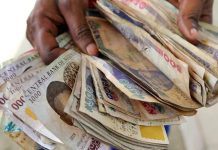Trading in the fixed-income securities market was uneven on Thursday, as investors continued to optimize tactics for enhancing portfolio returns in the face of a lack of investment possibilities.
Bond sales continue, despite a lackluster transaction record in the secondary market for Nigerian Treasury bills due to tight liquidity in the banking sector.
Short-term benchmark market rates climbed marginally Tuesday, as signs of liquidity concerns emerged. The open repo rate rose 14 basis points to 1.07 percent. In addition, the overnight lending rate rose 21 basis points to 1.57%.
CardinalStone said in its market update that activity in the FGN secondary bond market was modest, with numerous benchmark players closing around their flat line. Nonetheless, experts reported minor selloffs in 23-MAR-2025 bonds. The selloff reached 66 basis points and ended at 9.62%.
Cordros Capital traders highlighted that throughout the benchmark curve, the average yield grew at the short (+14bps) and long (+2bps) ends, capturing the temperature in the secondary market for Nigerian bonds.
The drop was caused by asset/fund managers selling MAR-2025 (+67bps) and JUN-2053 (+20bps) bonds, respectively. At the mid-segment, the average yield remained steady.
The 10-year, 20-year, and 30-year FGN bonds held steady at 13.22%, 14.60%, and 14.96%, respectively. Overall, the yield curve expanded by four basis points to 13.27%.
Elsewhere, fixed income market analysts spotted that FGN Eurobonds faced depreciation across all tracked maturities, reflecting sustained bearish sentiment. This translated into an average secondary market yield increase by 10 basis points to 10.41%.
The Nigerian Interbank Treasury Bills True Yield observed a downward trend across most maturities, driven by demand pressure, which pushed yields lower, Cowry Asset Management told investors. Nonetheless, the average secondary market yield on T-bills remained at 7.01%.













